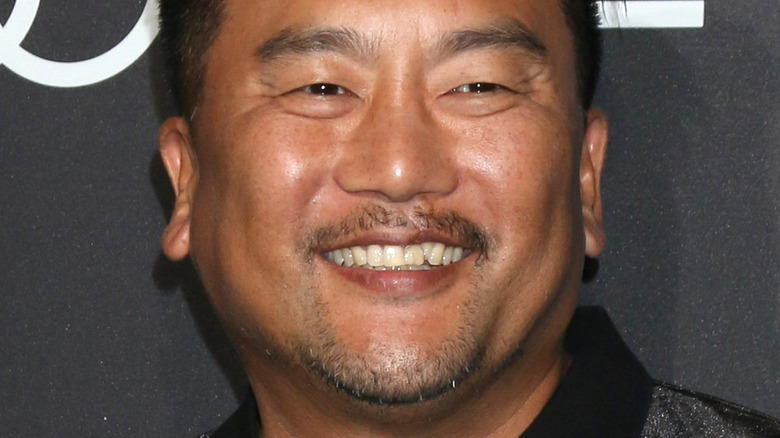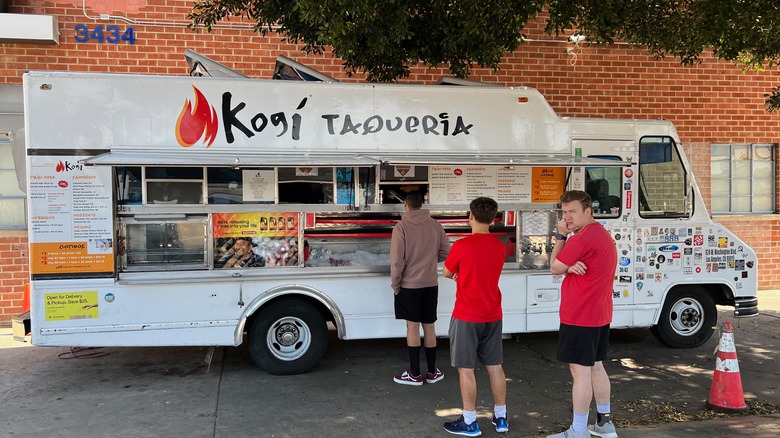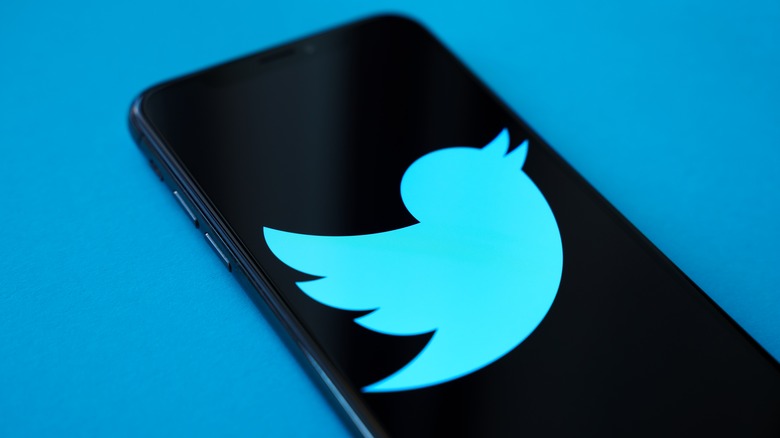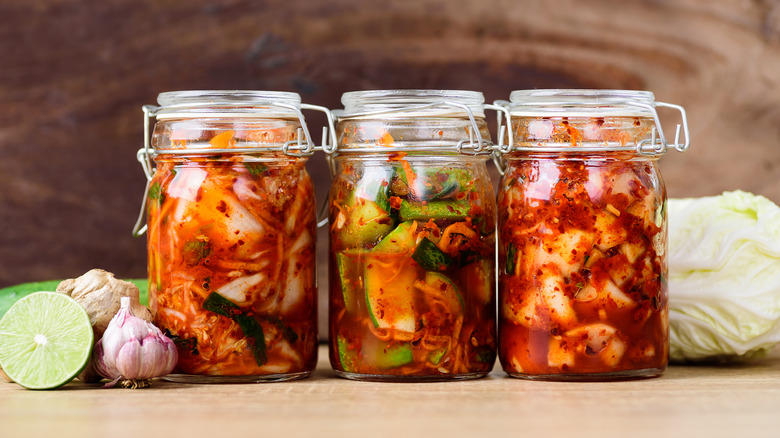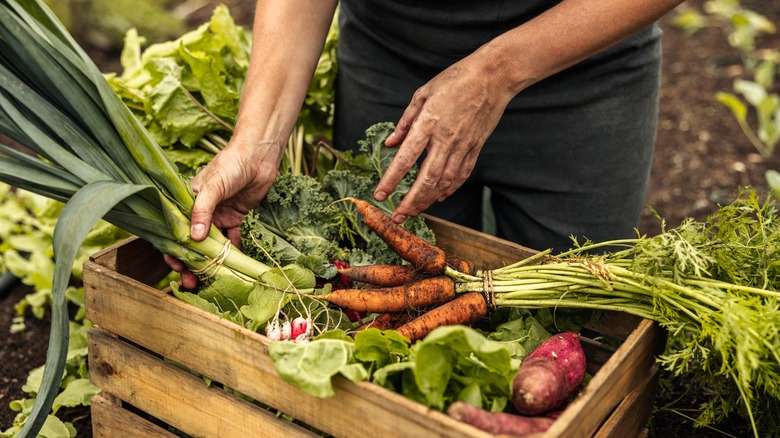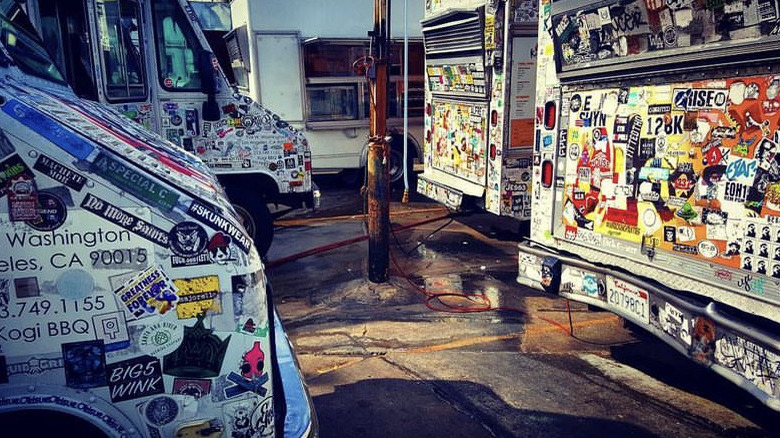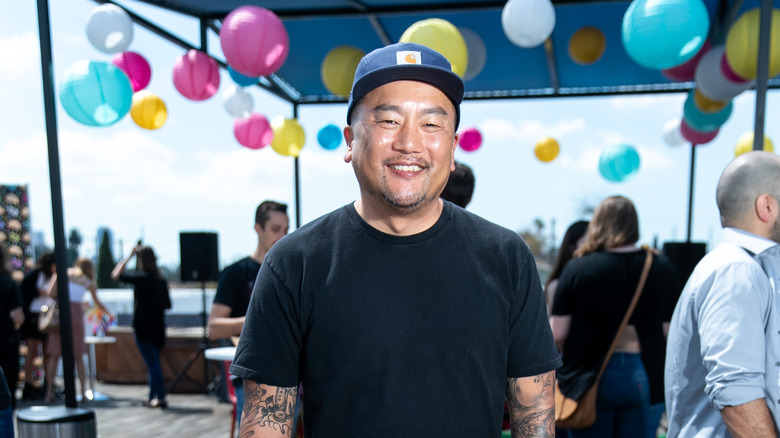8 Secrets Of Chef Roy Choi's Food Truck Success
Celebrity chef Roy Choi's list of accomplishments is beyond dazzling. Choi studied at the Culinary Institute of America, has worked in elite culinary settings, has written multiple best-selling books, innovated American gourmet food truck restaurant culture via Kogi Korean BBQ-To-Go, and has created endless media, including the PBS show "Broken Bread" (via the Culinary Institute of America). He's been named one of Time's "100 Most Influential People," has penned a memoir, was named the 2010 Food & Wine "Best New Chef," earned praise from and befriended Anthony Bourdain, launched groundbreaking fast-food operation Loco'l, and has had his hand in the creation or innovation of a growing list of remarkable eateries.
Chef Choi is now a food celebrity, teaching and speaking on about culinary arts, business, and creativity all over the world, while rubbing elbows with some of the biggest names in Hollywood. He has simultaneously managed to fight for social equality through his work with food (via Grub Street). So, how did Roy Choi become a trailblazer in the world of food? What are the secrets behind Roy Choi's viral food truck empire? And what can we learn from his one-of-a-kind success story?
Choi's work was influenced by his Korean mom and immigrant roots
"Food has been an integral part of my life — my whole life — ever since I was born," Choi told Yahoo Life. "I always had aunties in my house — my house was just always in motion, whether it was pickling or fermenting or slow cooking or roasting — it never stopped." Choi immigrated from Korea as a small child. Korean culture and food helped ground him as he navigated the immigrant experience.
"You have to navigate your whole existence while being ostracized and facing racism, prejudice, misunderstandings and language barriers... But outside of work, you can have the weekend to be your silly self, your family self," he explained. As a kid, his family joined others for weekend potluck picnics in the park. Here Choi experienced the sense of warmth and community that food can create.
Choi's parents themselves were relentless entrepreneurs who ran, at different times, a liquor store, a restaurant called Silver Garden, and jewelry business (via Thrillist). Roy Choi recalls his mother selling her beloved homemade kimchi out of car trunks at parks and bowling alleys when he was a kid. His mother was also known for her delicious Korean panchan.
Choi's mom is still garnering attention for her culinary gifts today. Her name is Jai but she likes to go by "Mommy Choi." After retiring from the jewelry business, she found additional success in developing her own collection of Korean-inspired sauces, under her own brand, Mommy Sauce.
L.A. food and culture is the lifeblood of Kogi
"We started [outside nightclubs] at midnight, serving this taco which tasted like the city," Choi said in a talk he gave to Design Indaba in South Africa in 2018. Kogi's Korean-Mexican fusion, gourmet street food tacos, delivered to people in the city's streets via food truck, ignited a national trend during the early Obama era. Choi is sometimes called the Godfather of the gourmet food truck movement. Yet, he continues to defer to the influence of L.A. street culture and gives credit to his community.
Kogi quite literally reflects the culture in the form of fusion food. Los Angeles consists of almost 50% Latinx citizens and close to 12% Asian Americans (via the US Census). "The taco is basically a yearbook portrait of my life," Choi told Yahoo Life. "Korean and Mexican food were a natural expression and evolution of my immigration, because we moved to L.A. which is basically a Latino neighborhood. I was influenced by what was around me and mashed them together."
Beyond the flavors, Choi and his team embody the spirit of L.A. in terms of creativity and community. Whatsmore, they walk the walk. Choi promotes food justice and aims to address hunger in Los Angeles via street food (via the LA Times). During the pandemic, Kogi fed the community for free. Choi continues to speak on local food injustices and is devoted to problem solving in the form of feeding the community that raised him.
Choi has a state-of-the art education
Beyond his at-home Korean food immersion training and the L.A. food culture influences he absorbed, Roy Choi had a high-end culinary education. Choi was formally trained at the prestigious Culinary Institute of America (CIA). The Culinary Institute of America is known widely as one of the most renowned culinary programs in the world. Choi graduated in 1998 and subsequently went on to work at some of the finest culinary establishments, such as French restaurant Le Bernardin and the famous, four-star Beverly Hills Hilton.
Ultimately, however, Choi's formal education, Korean cultural influence, and L.A. Latin American food influences combined with his love of community to aid in the creation of Kogi. Choi's elite education and professional background in those posh, high-end food settings gave way to success through the simplicity of the taco-filled with Korean short rib and a crisp artisan slaw.
Social media networking made Kogi a success
Bon Appetit called Choi "the first to make a food truck a destination when he opened Kogi in Los Angeles in 2008." Early Twitter was a huge part of this. "As a chef, I always think it's the food, but I think without Twitter it wouldn't be anything," Choi told NPR in 2009, as Kogi's success took L.A. by storm, "because I could have made these tacos, but I would have had no one to sell them to." The Kogi team tweeted the food truck location for the night, initially focusing on feeding bar and club crowds. It worked.
"We were out on the streets," Choi said in an interview with Fast Company. "We went up to the dorms, and all the kids came out. That's when Twitter was just becoming popular. It was at night. They were studying. We went to the co-op housing where they were all studying. It was finals. Everyone was around. Word got out, I think there were fliers all over campus about this mysterious taco truck that served Korean barbecue for $2 and it's coming here. There were a thousand kids out there."
Choi suggests that entrepreneurs focus on being authentic in social media marketing. "That's the weird thing about social media," he told Restaurant Hospitality. "It is probably the thoroughfare that will lead you the quickest to prosperity and success, but at the same time it will crash and burn if you're not being honest."
Kimchi fueled Choi's tacos and vision
"Everything I am comes from kimchi," Choi wrote in his memoir, "L.A. Son: My Life, My City, My Food." Choi's mom used to make a killer kimchi that was beloved in their neighborhood. Choi has memories of his mom selling jars of it on the streets, out of the family's car trunk. The mildly spicy fermented cabbage is, for Choi, a metaphor for life. Kimchi is the first recipe in his memoir collection.
"It is everything I am," Choi told NPR. "You have to constantly take care of it. It's like a sour-dough starter: You're always evolving it and refreshing it and morphing it into something. So, you'll make kimchi and then, as it's running low, you'll move over and ferment more, take a little bit of that and it'll just continue on. So it's this long string that goes throughout your life. A lot of people think kimchi is just one thing. It's not. kimchi is a term that refers to the process of fermenting vegetables, most people think of it as the cabbage kimchi, but kimchi refers to many different things -– cucumbers to chives to garlics, lettuces, anything."
Choi's passion for food justice drives him
In 2016, Anthony Bourdain wrote in Time, "Roy Choi has put it all on the line to improve the quality of life for people few others seem to care about. It's not a pose, it's not a cause: it's who he is."
To date, Choi remains motivated by not only food, profits, or notoriety, but by a fervent belief that good and nourishing food should be accessible to all. His PBS television project, "Broken Bread," is a platform for promoting food justice awareness. Choi has used Kogi's viral success to fund numerous projects that benefit the most distressed people in Los Angeles. Choi emphasizes the fact that there is no lack of food in this world, there is a problem of distribution and access. "We will throw away food before we feed someone who needs food. That's fundamentally a broken system, a broken thing," he tells Salon.
Choi sees food as a way to open up the discussion. He knows that food is a common ground anyone can understand. "Food is our Trojan horse," he said in an interview with KCRW. "It is our positive weapon to bring everyone in because sometimes it's hard to talk about these things or even confront these things. If we're going to confront the inequalities of life, especially amongst us as humans, it would require a lot of us to take a deep, hard look in the mirror. And that's really tough."
Choi doesn't let fear of failure block creativity
"All the little things: the thoughts in the shower, the thoughts on the s*****r, driving in the car, weird thoughts on the couch, being drunk, being stoned, imaginations, little ideas. We are trained to disregard and to devalue all that stuff. But to me, I do the inverse. I value all that stuff," Choi explained in an interview with GQ. "And then, even if one little thing — one little silver — comes out of all of that nonsense, then that means something to me."
Choi warns budding entrepreneurs and creatives not to be afraid of failure, because he doesn't see failure as failure. This may be because Kogi's international fame was born out of a perceived failure. "Go back and excavate all the things that happened, and then make a 2.0 version from that — or even use little elements of it to contribute to your next project," Choi said.
"We have such a desire to control everything, and our inability to understand our impermanence in this life forces us to also create this framework of success or failure, not looking at what can come out of failure ... Whatever's gonna come out of Kogi, comes out of failure. I got fired. And I couldn't get a job. And then out of failure, I became a revolutionary and created a food movement."
Choi took the long road, but never gave up
Today, Roy Choi is a food icon. Yet he took the long and winding road toward this wild, viral success. Choi struggled with drugs, a gambling addiction, drinking, and subsequent depression during his younger years. He had an artistic spirit but didn't easily fit into traditional paths of success. "It was really difficult. I went through a lot of drugs and gambling all the way into my mid-twenties," he told AskMen. "I could never express myself in the traditional forms and it sent me spiraling into anxiety, depression, and addiction because I had to abandon my creative feelings and go and get a traditional job, try to go to school."
At his lowest point, without friends, sleeping on couches and in motels, drinking daily, Choi was bottoming out. He saw Emeril on a cooking show while laying on the sofa and felt a spark of inspiration. "I went out and started researching the culinary world and chefs that I knew nothing about. Then I moved to New York and went to culinary school, and everything just fit like a glove. It's been on ever since."
"I guess the moral of the story is sometimes, it takes 30 years to get there, but it doesn't mean you can't get there," reflected Choi. "Sometimes people are lucky, and they get there at 16 or 17. But sometimes you get there at 36 or 38, and it opens up a whole new world."
